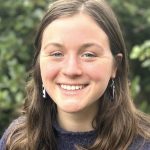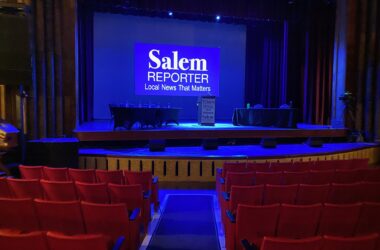Neighbors just south of downtown Salem have spent half a century advocating for better traffic flow, signs and parks.
The South-Central Association of Neighbors, or SCAN, recently celebrated its 50th anniversary, the third neighborhood association in Salem to reach the landmark.
SCAN is situated south of the central business district and borders the Willamette River to the west and 12th Street to the east. Within the neighborhood, you’ll find the Deepwood Museum & Gardens, Fairmount Park and Bush’s Pasture Park, one of Salem’s most expansive parks.
After compiling old newspapers about the association Jim Scheppke, the current vice president, said, “The most surprising thing to me was that 50 years ago they were doing the same thing we are doing today.”
The association was originally formed as a result of a proposal to close Baker Elementary School.
Robert Logan, then-chair of SCAN’s board of directors, told the Capital Journal in April of 1973, “If you close the schools, you take away the incentive for people to live in the neighborhood.”
The founders of the association organized around additional issues including the area changing from single-family homes to apartments, heavy traffic on Southeast Commercial Street and other arterials and unsightly signs, according to Capital Journal article.
“It takes a community, neighbors and a big group of people to work toward maintaining active associations,” said Irma Coleman, the city’s neighborhood program coordinator.
She said that SCAN is lucky with its central location, which gives them the opportunity to build relationships with people already involved such as volunteers from Bush’s Pasture Park and South Salem High School.
Coleman described SCAN as a “group of neighbors that really love their neighborhood and work hard to keep it flourishing.” She said it’s one of Salem’s more active neighborhood associations.
In its early years, one of SCAN’s greatest feats was to block the city’s plan to build a “third bridge” over the Willamette River at Southeast Mission Street as it would have disrupted their neighborhood.
Early association members were concerned with similar issues today such as traffic, construction and not having enough kids in the neighborhood, said Scheppke.
With the eventual closure of Baker Elementary School in 2004, the closure of the Oregon School for the Blind in 2009 and the recent relocation of Bush Elementary to outside the neighborhood’s boundaries, SCAN now has just McKinley Elementary School and South Salem High School.
Victor Dodier, the president of SCAN, has lived within the neighborhood since 1992. He described it as “getting older.”
He hopes to see more families move into the area to keep the neighborhood active. But, without many schools in the area, it makes it a less desirable place for families to raise their kids.
Priorities for the organization include improving roads, pedestrian safety and advocating for better parks. They also seek to support affordable housing, including the prohibition of unoccupied short-term rentals, like Airbnbs.
Scheppke has lived in the neighborhood since 1986 and decided to join SCAN once he retired to be more involved in his neighborhood. Fellow retirees make up the majority of the 15-member board which has slightly fluctuated throughout the association’s history, Dodier said.
Most recently, SCAN concentrated its efforts at a June 19 city council meeting to help vote down a zoning ordinance that would have allowed for taller buildings, denser housing and more mix-used development within the neighborhood.
“With the topography of south central Salem, the tall building would really stand out,” said Scheppke.
The council voted it down 5-4 after hearing testimony from opposed residents.
Dodier and Scheppke helped organize SCAN, going door-to-door and encouraging neighbors to get involved.
Both said with all the hills in their neighborhood, a tall building would feel even taller and be a disruption to people’s houses. One neighbor told them taller development would mean the end of their vegetable garden.
Scheppke said at the meeting he felt they, “came off as a bunch of NIMBYs who don’t want change.”
However, both Dodier and Scheppke were okay with the denser housing, and the mix-used development the ordinance would have encouraged. They want to see their neighborhood evolve while keeping the best interests of their community in mind.
Both leaders are most proud of their efforts to regrow the board following Covid and get younger members involved.
“It’s hard for people with kids to turn up at 6:30 on a Wednesday,” said Dodier. But they’ve recently added several newer members.
Coleman said she had been impressed with every SCAN meeting she has attended, and appreciates the interesting speakers they bring in every month to help their community stay connected to local projects.
Safer bikeways are a priority for the association.
“You need to be strong and fearless” to bike in most of the neighborhood, Dodier said.
Association leaders said there’s a reluctance to address the lack of bike infrastructure because few cyclists are visible in the neighborhood. They said the situation is so dangerous people do not want to bike.
It’s a “if you build it they will come” situation, said Scheppke.
Another accomplishment leaders were proud of was getting the Salem Art Fair & Festival to move out from under the oak trees at Bush’s Pasture Park to the open field, reducing damage to the native trees.
SCAN meets on the second Wednesday of every month at 6:30 p.m. at the South Salem High School library during the school year. In the summer, they meet at Pringle Hall. There will be no meeting in August.
Before the pandemic, they had 20 to 30 people at the meetings, but participation dropped as meetings moved to Zoom.
Now they are fully back in person and having difficulty getting people to come out.
Coleman wishes that more people knew about their neighborhood associations and would get involved.
“The possibilities are endless when it comes to working with the city and your neighborhood,” said Coleman.
This summer, SCAN leaders hope to get approved for a painted street mural sometime in August.
The city is excited to help fund these murals and Coleman said, “It really helps build engagement within the community.”
Contact reporter Natalie Sharp: [email protected] or 503-522-6493.
SUPPORT OUR WORK – We depend on subscribers for resources to report on Salem with care and depth, fairness and accuracy. Subscribe today to get our daily newsletters and more. Click I want to subscribe!

Natalie Sharp is an Oregon State University student working as a reporter for Salem Reporter in summer 2023. She is part of the Snowden internship program at the University of Oregon's School of Communication and Journalism.









